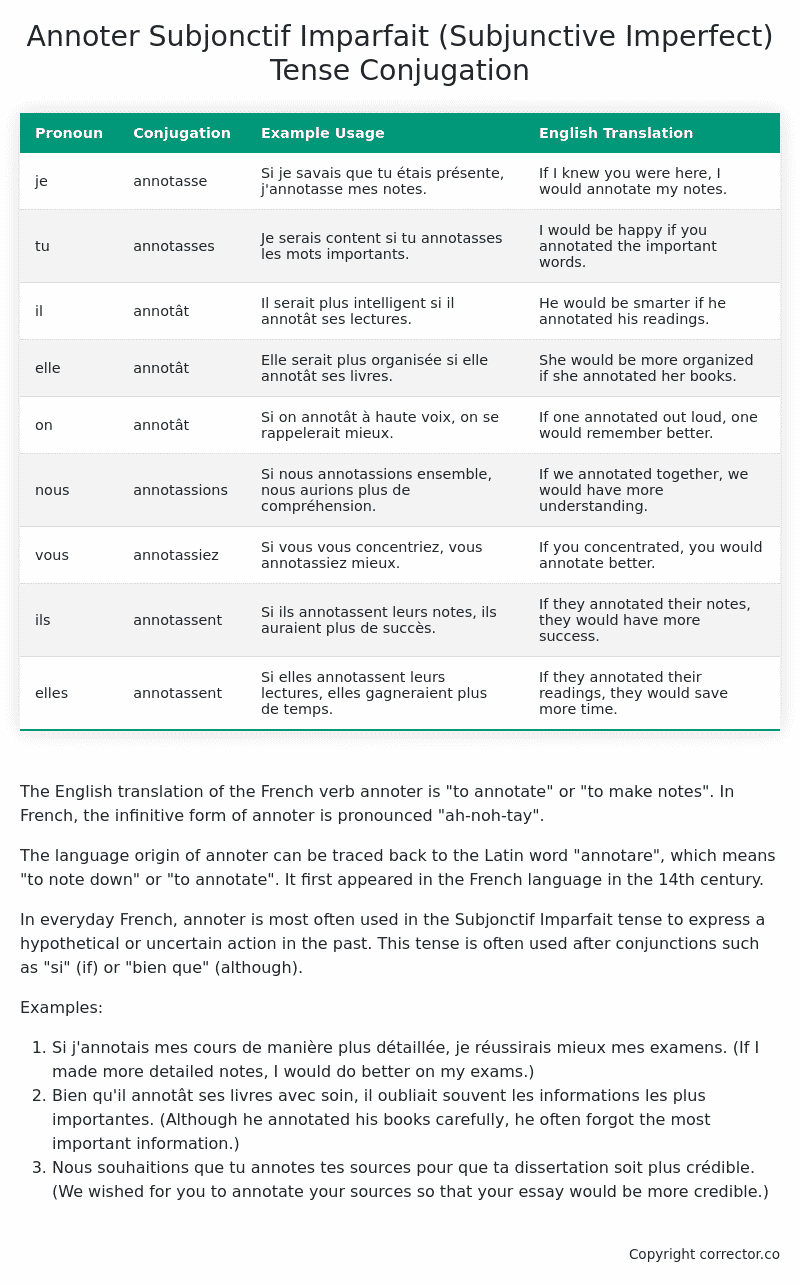Subjonctif Imparfait (Subjunctive Imperfect) Tense Conjugation of the French Verb annoter
Introduction to the verb annoter
The English translation of the French verb annoter is “to annotate” or “to make notes”. In French, the infinitive form of annoter is pronounced “ah-noh-tay”.
The language origin of annoter can be traced back to the Latin word “annotare”, which means “to note down” or “to annotate”. It first appeared in the French language in the 14th century.
In everyday French, annoter is most often used in the Subjonctif Imparfait tense to express a hypothetical or uncertain action in the past. This tense is often used after conjunctions such as “si” (if) or “bien que” (although).
Examples:
- Si j’annotais mes cours de manière plus détaillée, je réussirais mieux mes examens. (If I made more detailed notes, I would do better on my exams.)
- Bien qu’il annotât ses livres avec soin, il oubliait souvent les informations les plus importantes. (Although he annotated his books carefully, he often forgot the most important information.)
- Nous souhaitions que tu annotes tes sources pour que ta dissertation soit plus crédible. (We wished for you to annotate your sources so that your essay would be more credible.)
Table of the Subjonctif Imparfait (Subjunctive Imperfect) Tense Conjugation of annoter
| Pronoun | Conjugation | Example Usage | English Translation |
|---|---|---|---|
| je | annotasse | Si je savais que tu étais présente, j’annotasse mes notes. | If I knew you were here, I would annotate my notes. |
| tu | annotasses | Je serais content si tu annotasses les mots importants. | I would be happy if you annotated the important words. |
| il | annotât | Il serait plus intelligent si il annotât ses lectures. | He would be smarter if he annotated his readings. |
| elle | annotât | Elle serait plus organisée si elle annotât ses livres. | She would be more organized if she annotated her books. |
| on | annotât | Si on annotât à haute voix, on se rappelerait mieux. | If one annotated out loud, one would remember better. |
| nous | annotassions | Si nous annotassions ensemble, nous aurions plus de compréhension. | If we annotated together, we would have more understanding. |
| vous | annotassiez | Si vous vous concentriez, vous annotassiez mieux. | If you concentrated, you would annotate better. |
| ils | annotassent | Si ils annotassent leurs notes, ils auraient plus de succès. | If they annotated their notes, they would have more success. |
| elles | annotassent | Si elles annotassent leurs lectures, elles gagneraient plus de temps. | If they annotated their readings, they would save more time. |
Other Conjugations for Annoter.
Le Present (Present Tense) Conjugation of the French Verb annoter
Imparfait (Imperfect) Tense Conjugation of the French Verb annoter
Passé Simple (Simple Past) Tense Conjugation of the French Verb annoter
Passé Composé (Present Perfect) Tense Conjugation of the French Verb annoter
Futur Simple (Simple Future) Tense Conjugation of the French Verb annoter
Futur Proche (Near Future) Tense Conjugation of the French Verb annoter
Plus-que-parfait (Pluperfect) Tense Conjugation of the French Verb annoter
Passé Antérieur (Past Anterior) Tense Conjugation of the French Verb annoter
Futur Antérieur (Future Anterior) Tense Conjugation of the French Verb annoter
Subjonctif Présent (Subjunctive Present) Tense Conjugation of the French Verb annoter
Subjonctif Passé (Subjunctive Past) Tense Conjugation of the French Verb annoter
Subjonctif Imparfait (Subjunctive Imperfect) Tense Conjugation of the French Verb annoter (this article)
Subjonctif Plus-que-parfait (Subjunctive Pluperfect) Tense Conjugation of the French Verb annoter
Conditionnel Présent (Conditional Present) Tense Conjugation of the French Verb annoter
Conditionnel Passé (Conditional Past) Tense Conjugation of the French Verb annoter
L’impératif Présent (Imperative Present) Tense Conjugation of the French Verb annoter
L’infinitif Présent (Infinitive Present) Tense Conjugation of the French Verb annoter
Struggling with French verbs or the language in general? Why not use our free French Grammar Checker – no registration required!
Get a FREE Download Study Sheet of this Conjugation 🔥
Simply right click the image below, click “save image” and get your free reference for the annoter Subjonctif Imparfait tense conjugation!

Annoter – About the French Subjonctif Imparfait (Subjunctive Imperfect) Tense
Formation
Common Everyday Usage Patterns
Interactions with Other Tenses
Subjonctif Présent
Indicatif Passé Composé
Conditional
Conditional Perfect
Summary
I hope you enjoyed this article on the verb annoter. Still in a learning mood? Check out another TOTALLY random French verb conjugation!


